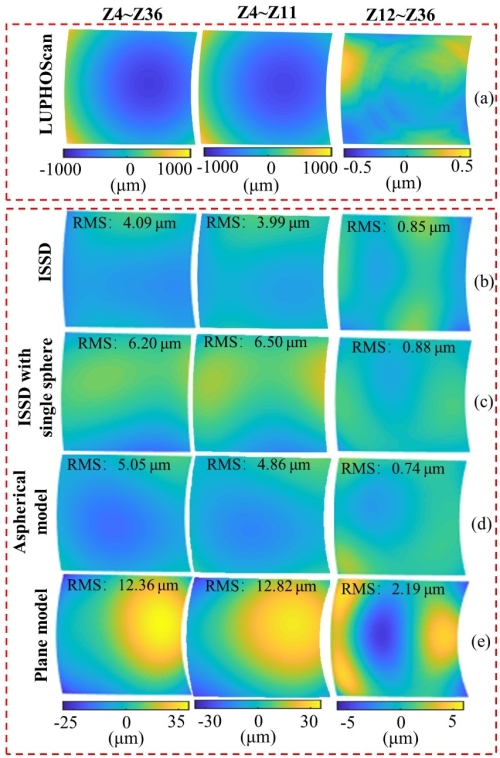Scientists who came from the Precision Optical Manufacturing and Testing Center of Shanghai Institute of Optics and Fine Mechanics (SIOM) of the Chinese Academy of Sciences (CAS) have proposed an iterative adaptive optimization algorithm using space-variant spherical models for the first time. This method eliminate the height-slope ambiguity in deflectometry, thereby realizing the high-precision freeform surface measurement without the condition of nominal surface model. The research results greatly improve the flexibility and stability of monocular deflectometry, expand the measurement ability of monocular deflectometry for complex optical components without the nominal surface models, and lay a foundation for the development of intelligent optical manufacturing in the future. The results were published in Optics Express on April 11, 2022.
Compared with spherical/aspherical surface, freeform surface has the advantages of flexible design, improved image quality, expanded field of view and simplified system structure, which will contribute to revolutionary development to optical system and become a promising and hot research direction of precision optics. However, it is a great challenge to accurately and flexibly measure the surface due to the asymmetry of freeform surface. Deflectometry has the advantages of high precision, large dynamic measurement range and strong anti-interference ability, and has the potential to achieve high-precision in-situ measurement of complex optical surfaces.
However, there is a high-slope ambiguity issue, because the indefinite ray directions of the screen cause many possible combinations between the measured height and the normal vector. The monocular deflectometry has sharp difficulty to measure the unknown surface shape or surface shape error scenarios (such as error of grinding surface shape and rough cast phase realize the level of microns and even millimeters).
To solve this problem, researchers proposed an iterative adaptive optimization algorithm using the space-variant sphere models. The optimal space-variant sphere model provides the initial solution of the measured freeform surface, and achieves the high-precision deflectometry of the complex freeform surface without prior model conditions. According to the specular reflection theorem, the four-dimensional spherical parameter (X, Y, Z, R) problem is simplified to the one-dimensional spherical radius parameter (R) optimization problem. According to the self-constraint conditions of deflectometry, the radius parameters of space sphere are calculated iteratively and the adaptive optimization of space sphere model is realized. In addition, in order to satisfy the accurate model estimation of the complex freeform surface, the freeform surface is approximated by the space-variant sphere model. Iterative reconstruction error is used to achieve adaptive segmentation of freeform surfaces, thereby completing the high-precision reconstruction of complex free-form surfaces.
This method plays an important role in the measurement of complex free-form surfaces with unknown models, and can greatly release the positioning accuracy requirements of the workpiece, and greatly improve the ability and application range of monocular deflectometry.

Fig.1 Measurement results of complex freeform surface. (Image by SIOM)
Article website:
https://doi.org/10.1364/OE.454743
Contact:
WU Xiufeng
General Administrative Office
Shanghai Institute of Optics and Fine Mechanics, CAS
Email: xfwu@siom.ac.cn
Web: http://english.siom.cas.cn/